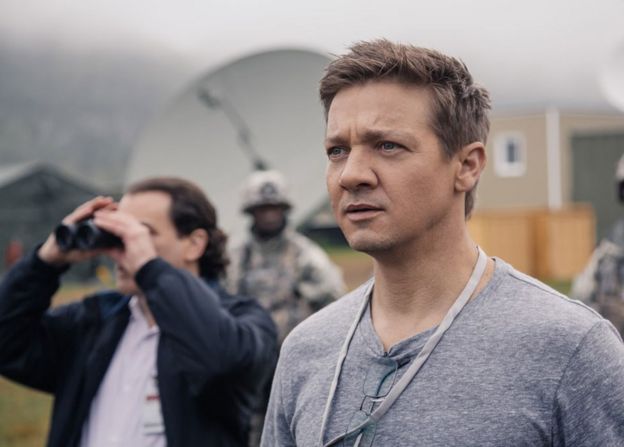In “Arrival,” a fascinating blend of meat and potatoes
procedural and lyrical, high concept Sci fi, director Denis Villeneuve once
again demonstrates his knack for crafting gradual onscreen tension and
anticipation. He’s a filmmaker who gently grabs you by the collar of your shirt
and firmly pulls you into his world, not letting go until the final credits
roll. Then again, you don’t want to him to let go.
Villeneuve knows that sometimes the build up to an event can
be more exciting than the event itself. Case in point: going to meet a
mysterious alien race for the first time.
When Dr. Louise Banks (Amy Adams), a linguist, gets
recruited by the government to communicate with a race of alien beings that have
landed all around the earth Villeneuve drags the process out in the best
possible way. We see the initial helicopter ride from Banks’ house to the
military encampment in Montana. We see the prep work: Banks and her partner Ian
Donnelly (Jeremy Renner) are briefed on their mission by Colonel Webber, (Forest
Whitaker) they take the necessary shots and pills. They put on their Hazmat
suits. They drive from the military encampment to the alien vessel, a massive
oval shaped structure levitating a few feet off the ground. The team is raised
up into the vessel via cherry picker. We observe the perplexed look on Banks
and Donnelly’s face as they adjust zero gravity for the first time. And
then…they meet the creatures.
“Arrival” isn’t too sluggish; it’s not like it takes an hour
or a half hour to meet the aliens but Villeneuve clearly savors the journey
getting to them as much as the encounter itself. If you were going to meet and
converse with extraterrestrial beings how would you feel? You’d probably feel an
overwhelming combination of nervousness, excitement, uncertainty and curiosity.
A million questions would flash into your mind at light speed: Who are they?
Are they friendly? Am I going to die? Are they little grey men like they were
in “Close Encounters of the Third Kind?” Can they speak English?
Through its deliberate pacing (punctuated by long takes and
slow pans/zooms), “Arrival” brilliantly captures the anticipation and suspense
that would go with encountering an alien species for the first time. And this
drawn out style persists through the rest of the picture, keeping you fully
absorbed in the narrative.
Adams conveys that initial anticipation beautifully, giving
a rich and strongly nuanced performance. Banks is intelligent and strong
willed, yet not opposed to expressing emotion. When she gets raised up into the
vessel she begins to breathe heavily—adjusting to her Hazmat suit and the new
environment, as well as trying to shake off her nerves. In this moment (and in
others) we see vulnerability in her. Adams is understated but authoritative,
confident in herself and her ability to do the job well, while at the same time
haunted by some past emotional baggage (that we see via fragmented flashbacks).
After the initial encounter “Arrival” settles into a
patient, elegant rhythm, as Banks and Donnelly attempt to establish a
communication system between the creatures to figure out (along with research
teams from around the world) why they’re on earth. For the most part, the
picture assumes a straightforward procedural structure, with the mystery
gradually unfolding.
Accompanying this hunt for the truth is the film’s
thought-provoking focus on the importance of communication, especially in a
time of global crisis. If we don’t communicate, or rather, if our attempts at
communication break down, it can lead to rash decision-making, which can then
lead to chaos. Furthermore, the film is about how the fear of the unknown can
also lead to careless decisions. Trying to figure out a way to communicate with
aliens is a daunting, complex process that takes a long time. However, the
government is impulsive and afraid (afraid of a hostile invasion), wanting
results right away and when they don’t get what they want it causes them to
seek out hasty and potentially damaging solutions like mobilizing armed forces.
In other words, we’re often too impatient, we want solutions right away, and
that impatience can easily lead to conflict, whether it’s global or
intergalactic.
In one of the best scenes,
when the government is feeling the pressure to deliver results, Banks proceeds
to break down the complexity of the question: “what is your purpose?”
explaining that they have to start out with simpler sentences and teach the
aliens the various aspects of grammar. Language is messy and complicated, as is
translation and even the smallest mistake (a wrongly interpreted phrase or
word) caused by pressure or fear can lead to a breakdown in communication and
make way for more conflict.
Villeneuve and screenwriter Eric Heisserer distill these
heavy issues (and countless others) into a tense genre thriller structure that’s
accessible without being heavy handed.
The ending is peculiar in the way that is provides an answer
of sorts to the mystery (along with a major twist that feels deserved) but said
answer doesn’t completely make sense right away. Even now, I’m still trying to
put all the pieces together, which is a good thing. That being said, I think
the final climactic action (involving a phone call) that leads to resolution on
a global scale is a little sudden and clumsy in execution.
I have a few other minor issues but they don’t really
matter; “Arrival” is a challenging, highly entertaining Sci fi drama/thriller
executed with near flawless precision and craftsmanship. Villeneuve continues
to prove he’s one of the best directors working today.
B+



No comments:
Post a Comment